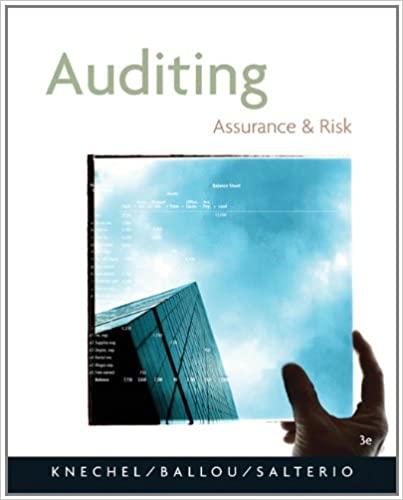Auditors typically rely on the following legal defenses when parties bring suit against them: - No responsibility
Question:
Auditors typically rely on the following legal defenses when parties bring suit against them:
- No responsibility to plaintiff
- Lack of reliance by the plaintiff
- Auditor exercise of due diligence
- Lack of auditor intent to defraud
- Contributory negligence by management Consider each of the following independent situations:
a. The shareholders of a large, multinational firm bring a class-action lawsuit under common law against the audit firm. They charge that the audit firm was grossly negligent in its responsibilities in that it failed to detect a material management fraud that ended up pushing the firm into Chapter 11 bankruptcy.
b. The shareholders of a retail women's clothing chain bring a lawsuit against the audit firm charging that the audit firm was negligent in not making a large writedown of some obsolete inventory. When the need for the write-down later became public, the company's stock lost 25 percent of its value in one day.
c. The creditors of an aerospace concern that has defaulted on its secured debt file suit against the accounting firm that performed a review and some tax work for it.
d. The shareholders of a large retail drugstore chain file suit against the auditors when it comes to light that the managers have been embezzling large amounts of money from the company treasury. The audit firm had substantially complied with professional standards in its audit, but the managers had colluded in such a way that detection of such a fraud would have been difficult in any circumstances.
e. A large software company files suit against the audit firm of its largest rival when its needless rushing to put out a comparable product jeopardizes its good reputation in the software market. The rival firm went bankrupt shortly after the product's release, but its auditors had not made a going concern qualification in the last audit report. The software company argues that it relied on the rival firm's audit report in its decision to rush its own product to market.
f. The shareholders of a large carpet cleaning chain file suit against the auditors when it comes to light that the firm had far fewer bona fide sales than was alleged in the financial statements. The owner of the firm had entered the false sales in an attempt to puff up the financial statements to attract investors and franchisers. The audit team had sampled the sales transactions as part of its substantive tests of account balance details and had found, correctly, that the sampled sales were legitimate.
For each of the preceding, suggest a defense that the audit firm may employ against the plaintiffs. Note where the defense might be different if the case was litigated outside the U.S.
Step by Step Answer:

Auditing Assurance And Risk
ISBN: 9780324313185
3rd Edition
Authors: W. Robert Knechel, Steve Salterio, Brian Ballou





